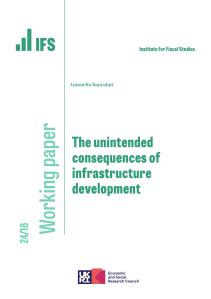The Scottish Government has used its devolved tax and benefit powers to craft a more progressive system than is in place in the rest of the UK. On average, taxes are higher for high-income households, and benefits more generous for low-income households.
Its changes to income tax mean someone earning £50,000 will pay around £1,500 more in income tax this year than if they lived elsewhere in the UK. The average cost of these changes to households in the top 10% of the income distribution is around £1,700 a year, equivalent to just over 2% of after-tax income.
Cuts in income tax for those on lower incomes are much smaller – at most £21 per year. And the Scottish Government’s five-band system of income tax is unnecessarily complex. It could have achieved similar changes in tax bills – indeed slightly more progressive changes – if it had introduced a small 0% band on top of the UK-wide tax-free allowance, and applied its 21% ‘intermediate’ rate directly above that.
Low-income households gain much more from the Scottish Government’s increases in benefits. These include a top-up to carer’s allowance, more generous housing benefit for those in social housing who have what the UK government deems to be ‘spare’ bedrooms, and extra payments for families with young children on means-tested benefits. Taken together, these will boost the incomes of the poorest fifth of Scottish households by an average of almost 1.5% this year, with temporary pandemic payments coming on top and further permanent increases in the pipeline.
A natural drawback of making the system more progressive is that it weakens work incentives, as people have more to lose by coming off benefits and paying more income tax.
These are among the findings of a new Scottish Election Briefing Note on devolved taxes and benefits by IFS researchers, funded by the Scottish Policy Foundation as part of its programme of work to inform public debate in the run-up to the Scottish parliamentary elections.
Looking at the Scottish Government’s permanent tax and benefit reforms, the Briefing Note also finds that:
- Council tax was made less regressive in 2017 by increasing the tax rates that apply to properties in Bands E to H. But, like the UK government in England, the Scottish Government has failed to grasp the nettle and introduce much-needed fundamental reforms, most notably to update property valuations that are now ridiculously 30 years old.
- A range of targeted business rates reductions provide immediate support to hard-pressed firms and will promote development of commercial property. But they also further complicate an already overly complex system. And in the long term the main effect is likely to be higher commercial rents than we would otherwise see, benefitting landlords more than those businesses occupying the properties.
- As well as making benefit rates more generous, the Scottish Government has given universal credit recipients more flexibility in how they are paid and is planning improvements to the process of assessing entitlement to disability benefits. These should both make life easier for claimants. The test will be whether the admirable intentions and welcome direction of travel are reflected in improved performance in practice.
- Taken together, the changes in devolved tax and benefit arrangements during the current parliament are very progressive. Using Scottish rather than rUK rates of income tax and benefits, combined with real-terms changes to council tax seen since 2016, costs Scottish households £270 a year on average (0.8% of their average income), but that rises to £1,940 a year (2.4% of income) for the highest-income tenth while on average the lower-income half of households have gained.
The Briefing Note also considers short-term COVID-19 tax and benefit measures:
- The Scottish Government’s COVID-19 tax policy response is focused more on providing support to business cash-flow and less on stimulating spending via the housing market than the UK government’s policy. It is providing full business rates relief for the retail, hospitality and leisure sectors throughout 2021–22, whereas in England relief is capped at two-thirds from July onwards. In contrast, the temporary increase in its land and buildings transaction tax threshold – which was smaller to start with – expired at the end of March, whereas stamp duty land tax cuts are scheduled to apply in England and Northern Ireland until the end of September.
- Temporary additional support for households via the benefit system – including Pandemic Support Payments due to be paid later this year – is targeted at lower-income households, and particularly those with children. However, a freeze in council tax this year – funding for which is being made permanent to avoid the freeze being undone next year – provides the biggest cash-terms gains to richer households, as poorer households tend to live in lower-band properties and may already have their bills covered by the means-tested council tax reduction scheme.
Finally, it considers the case for further tax devolution, as called for by the current Scottish Government:
- Devolving the remainder of income tax would mean Scottish income tax changes could apply to all income – reducing the scope for tax avoidance. Devolving National Insurance contributions and capital gains tax as well would allow the Scottish Government to address the inefficient and unfair differences in tax treatments between different forms of income that currently exist. However, radical reforms would create many losers as well as winners and the current Scottish Government has shied away from such changes in the property tax sphere, where the requisite powers are already devolved.
- A devolved VAT would be difficult for the Scottish Government to administer and costly for businesses to comply with, especially for businesses with operations on either side of the Scottish border. Only if Scottish preferences on VAT policy differ significantly from those in the rest of the UK would it seem worth creating these problems.
Stuart Adam, a Senior Research Economist at the Institute for Fiscal Studies and an author of the report, said:
“The Scottish Government’s tax and benefit policies follow a strikingly consistent pattern: both over time and relative to the rest of the UK, they involve giveaways at the bottom and tax rises at the top. Changes to income tax, social security benefits, council tax, business rates, and land and buildings transaction tax have all contributed to that pattern.
Changes to the way benefits are paid should make life easier for claimants. In contrast, the tax changes have tended to complicate the system. The additional complexity in income tax is particularly unnecessary: a very similar pattern of tax payments could have been achieved without the need for separate 19%, 20% and 21% rates.”
David Phillips, an Associate Director at IFS and another author of the report, said:
“The current Scottish Government has called for the devolution of National Insurance, capital gains tax and the remainder of income tax. Doing this would mean Scottish income tax changes could apply to all income – reducing the scope for tax avoidance – and allow the Scottish Government to address inefficient and unfair differences in how different types of income are currently taxed. Whether this opportunity would be grasped is another matter though: the current Scottish Government has shied away from radical reform where powers are already devolved. The case for devolving VAT also appears much weaker given the administration and compliance issues involved.
Hopefully in the remaining weeks of this election campaign we’ll see more discussion of how Scotland’s existing tax powers could be used. Like in England, it is time Scottish council tax was revalued and reformed. Fundamental reform of business rates and the reduction or abolition of land and buildings transaction tax could also make the system fairer and more efficient.”










